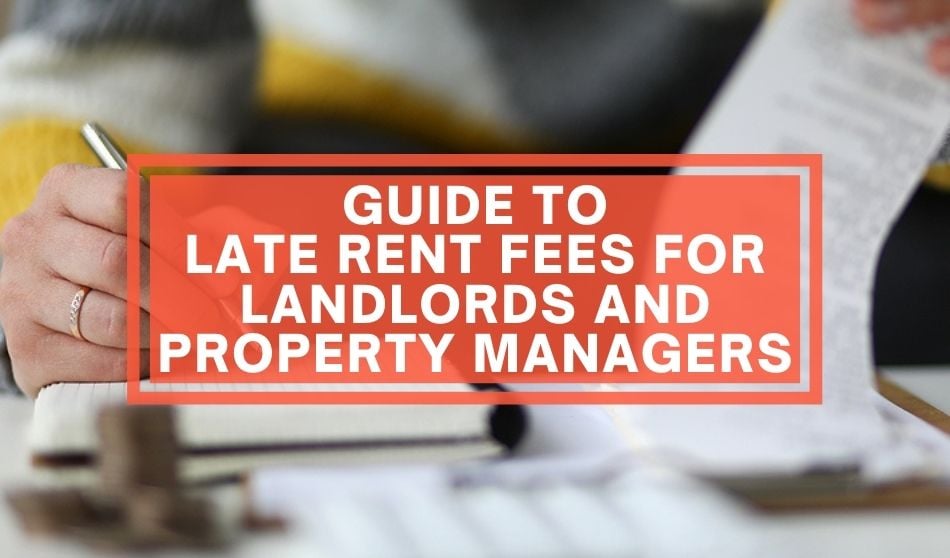When a renter pays rent late, most landlords will impose a late fee as a penalty to the late rent.
Late fees for rent payments are typically based on a reasonable percentage of the monthly rental rate (5-10%) or a flat fee. In most cases, a landlord can only charge a late fee if the terms are outlined in a lease agreement. If the lease does not include a late fee clause, the landlord cannot suddenly require his tenant pay a fee the next time rent is paid after the due date.
State and local laws dictate how much of a fee a landlord is allowed to charge for late rent payments. Whether you charge a percentage of the rent for the late fee or a flat fee for each day rent is late, there is usually a maximum amount a landlord can charge per month in late fees. Most courts believe a landlord should only charge a “reasonable” amount for a late fee, which sounds subjective, but is typically less than 10% a month.
Attorney James Laughlin told ezLandlordFroms that, “Courts generally find a late fee of 5% or less (of the monthly rent) to be reasonable but this does not hold true across the board.” As a general rule of thumb, landlords should provide a grace period of at least five days before the rent is considered late, and should never charge more than 10% of the rent as a late fee (to err on the side of caution, charge 5%).
Late fee laws also say when the late fee will be implemented. For example, some states allow a landlord to charge a late fee the first-day rent is late, while other state laws require that landlords allow a grace period after the official rent payment due date, and only allow late fees to be implemented after the grace period.
Despite an approved Grace Period, it is important to remember that rent is due on or before the due date. If paid after the due date, but before the end of the grace period, a late fee may not accrue, but the payment is still considered legally delinquent.
Late Fees and Your Lease Agreement
Your lease agreement should outline all rent payment terms, including your late fee policy. A good lease agreement will include:
- How much rent is due
- What day rent is due (and what happens if the due date falls on a weekend or holiday)
- Where rent should be paid (mailed, dropped off, paid online)
- What day rent is considered late (ie is there a grace period)
- What happens if rent is paid late (how much the late fee is and how the renter will be charged)
- What happens if rent is unpaid (including details on termination of tenancy)
You should reference any state statutes that apply to your rent payment terms and late fee policies. It is also wise to have an attorney familiar with landlord-tenant laws in your state review your lease agreement before you or your tenants sign it.
I waived my renter’s late fee once, and now he always pays rent late.
This type of landlord scenario is not uncommon, which is why you should always stick to your lease terms and collect late fees the first time a renter pays rent late. If your tenant gets away with paying rent after the due date and faces no consequences, it sets him up to repeat the behavior.
If you already made the mistake of waiving the late fee, stop the behavior now. Talk to your tenant and let him know that the next time rent is late you charge a late fee as outlined in your lease agreement. Send an official letter and reference the lease agreement.
Discover more tips for How to Get Your Tenants To Pay Rent On Time
Keep Communication Open
If you notice a pattern in one of your tenant’s rent payments being consistently late, talk to them about it.
Some tenants’ payday might fall after rent is due, so they will always be late. In this instance, you do not have to change your lease terms to accommodate them, and should continue to collect late fees, but at least you will understand what is going on and why they make late payments.
In other cases, your tenant might not realize how their late payment affects you as a landlord, so they might make it a priority to always pay on time or even early.
As a tenant, you should always be upfront with your landlord or property management company if you expect to make a late rent payment. By communicating with your landlord, he might still charge you late fees but he could hold off on the eviction process. He could also still give you a good reference if you decide to live somewhere else, because they appreciated your honesty.
Important Note: Keep in mind that laws surrounding late fees and the eviction process has been altered during the pandemic. This can make it a tough topic to navigate for landlords and renters alike. For more information for your area, check with a legal advisor.
Discover more information related to the pandemic, and the eviction moratoriums:
- What the CDC Eviction Ban Means for Landlords and Tenants
- A Landlord’s Guide to Rent Collection | Late Payments and Past Rent Debt
When are late rent fees illegal?
If there is no late fee clause in the lease agreement, a landlord cannot collect one. Most courts also only allow a reasonable amount to be charged as a late fee. For example, more than 10% of the monthly rent is typically considered unreasonable.
Nolo gives the following advice to renters for what to do if a renter has already agreed to unreasonably high late fees in a lease agreement:
If you’ve signed a lease or rental agreement that contains an outlandish late fee policy, you can still refuse to pay it and challenge it in court when the landlord seeks to evict you for breaking a lease provision. Why? Most courts consider the imposition of enormous late fees, like outrageous high-interest loans, to raise an important public policy issue. They will listen to your defense (though not necessarily rule in your favor) in spite of the landlord’s claim that you “waived” the right to protest when you signed the lease or agreement.
It’s usually better, however, that you not risk the threat of an eviction lawsuit (which always includes the possibility that you’ll lose). Instead, pay the fee if possible and file your own lawsuit in small claims court, asking that the judge order the landlord to return it. That way, the only thing at stake is your time and the small filing fee, not your home. But it goes without saying that once you’ve sued your landlord you can expect a termination notice at the first legal opportunity, and would do well to begin checking Craigslist for a new rental.
Late Fee Laws in My State:
To make sure you following late fee rental laws correctly, you need to check your state and local landlord-tenant laws. If you own a rental property that is part of rent control, additional laws will apply to your property and how you structure your late fee policy.
This article was originally published in October 2017 and has since been updated.







I’ve even offered to pay larger deposit and 5 month ahead!!!!
how about when you pay on the first and they don’t cash the check for 6 weeks because of a billing error that they caused.
Did your manager or landlord charge you a late fee based on their mistake? That doesn’t seem right.
When people take their time cashing checks, it can be annoying for your budget as you have to mentally account for those funds being spent. Unfortunately, I cannot think of any law that puts a time limit on when a landlord or property manager must cash a rent check. However, they should not charge you a late fee based on when they choose to cash the rent check, they should consider rent paid on the date the received the check.
In California we are required to deposit funds received in Real Estate transactions (this includes rent payments) within 3 business days. There are a couple of exceptions, but none that would apply here.
In Florida, the check has to be deposited withing 48 hours. Property Managers are licensed Real Estate Brokers, so the law applies to them as a Realtor. The tenant might have some leverage to let the property manager know that the check must be deposited in a timely manner by law. At least that might motivate them to deposit quickly in the future.
I had rented a house for 5 years and I moved out. But my landlord has charged all late fees more than 30 times when they return the security deposits. Of course, the fees are more than my security deposits. But they never asked me to pay late fee whenever I paid a rent late for 5 years. So I thought it was Ok to be two, three days late. In this case, do I have to still pay all the late fees?
Is it in your lease that late fees will be charged? Do they have proof for each time you paid rent late and a late fee was charged? This is an unusual situation to never get billed for the late fees until you move out. You might have a case to fight the charges. However, if it states in your lease the late fee policy and they have proof of late payments, then you still might be obligated to pay the fees. Good luck!
i dont have a lease anymoor
can you be charg
ed late fees on a month to month rental
i only had a 1 year lease but that was over in 2015 and they wont give me another lease so with no lease can they charge me late fees
Hi Micheal,
Generally, your original lease will state what happens as you move to a month-to-month agreement. You can still be charged late fees on a month-to-month agreement; your original lease should state when this will be charged and if there is a grace period (if applicable).
I have a question: I have a tenant who has not paid his rent for 5 months. I understand his situation and I want to help him, but how do I apply late charges? Do I do it once for the month he has not pay and that is it for that month or can I charge him for every time that monthly rent has not been paid?
For instance he is late as far as October last year. I October I charge him late fee for the unpaid October rent. In November he still has not paid October, can I charge him one late charge for October rent then again a second late charge in November for the October still unpaid rent?
Thank you,
Gerard du Parc
I wish there was a simple answer for you. Each state has its own regulations that would need to be followed. Some allow a monthly late fee as well as daily late fees. Some have a cap on how much may be charged and if it may be charged on the entire past balance or only on current rent due.
You may wish to contact legal counsel and/or the housing authority to review your lease or rental agreement to make sure it complies with those regulations and to ask if you may retroactively charge late fees. Having said that, what I’ve commonly encountered is if the tenants’ ledger is not at a zero balance after the grace period each month, a late fee would be applied to that ledger, regardless of which month has/has not been paid.
I have a tenant who moved in, refused to pay rent, and moved out within three weeks.
My property management company was able to keep his security deposit, but had charged him late fees for not paying rent, and is now keeping those fees on the books and took them out of his security deposit, that otherwise would have been paid out to me. This essentially charges me the tenant’s late fee for rent.
I asked them to remove the fees as I should not be responsible for the tenant’s late payment fees, especially since they were the one who vetted and approved the tenant, and they refused. Is this legal? Can they charge me the late fees for the tenant not paying rent?
This is an unusual circumstance. It’s rare to see someone have a late fee charged in the first few weeks when move-in payments are typically received in advance. Having said that, I am unable and unqualified to give legal advice but can tell you that it would depend on a few things such as your contract terms regarding keeping fees as well as state regulations on this topic if any.
Hopefully, this is just a simple miscommunication. Try seeing if you can speak to someone else in the management office who understands the accounting aspect and how this affects you. You may want to put your concern in writing and site your contract agreement terms regarding late fees. Hope this turns out well for you.
My landlord failed to cash 2 checks sent from texas rent relief, a third was issued but hes charged me over my state’s legal limit on several occasions, he is evicting me, I went to court for the eviction, the outcome is that I have to move in 2 weeks, leave apt rent ready, and if he wants to sue for rent he can do so after 30 days. The late fees hes charged is over 500, which is the rent I pay.. my legal aid attorney worked it out that the 500 be applied to my back rent. I got a confirmation that texas rent relief sent him a check of 1500. So if my rent is paid, can I sue him for excessive late fees from the time he started doing this
Sara, evictions are legal matters and unfortunately I can’t offer legal advice. Your local housing authority and the court house may be able to point you in the right direction for general answers but for your particular situation I suggest you reach out the the legal aid attorney that was helping you and/or another attorney familiar with rental real estate and evictions.
I paid $1846 on March 19, 2021. This was for partial rent in March-$214, 2 Security Deposits-$1100, and the last month of my lease-$550. Then when April I was awaiting ui benefits but I asked to use one of my deposits and they did. Then when May came around I guess they used the other one. Then I got renter’s assistance and they paid up to October along with paying all the months that had already been paid because they took forever to accept the program’s offer to help me. Which had been accurring $20 after the 3rd of each month. Then again assistance in December 2021 which paid up til May 1st. He said he thought my lease was up at the end of April and gave me 30 days to vacate on 4/30/22. My lease was up at the end Feb but noone addressed it and put me on a month to month with disclosing anything with me. He said that law didn’t apply to me. So I called west tn legal services because he said they didn’t want me to have to get anymore assistance or have to pay back what had already been disbursed. So they decided to terminate my lease. I just wished when my lease was actually up and I had extra funding to relocate instead of them just trying to get extra money should have told me of their plan to do all of this then I could have made a better decision w/ proper knowledge of such actions. WHAT CAN I DO AS FAR AS DISCRIMINATION OR UNFAIR TREATMENT?
Hi Gloria, I’m curious to hear what legal services had to say on this topic and if you ended up moving at the end of April. I don’t believe a landlord is required to give a disclosure when a lease expires because a non-renewed lease automatically become a month-to-month tenancy. From my understanding, if a landlord gives proper notice, they have the option to terminate a lease at the end of the lease agreement or a month-to-month tenancy at any time. Curious to hear how it all worked out for you and if you decide to share could you also provide what state you’re in as many regulations on termination and lease agreements are state specific.
I have paid my rent on time all year but now that the eviction rules have been lifted my manager unapplied all my rent payments to post to my previous balance from prior to Sept 2021, which they received landlord forgiveness funds on, and is now charging me late fees on all my current rent that I have paid and trying to evict me. Can they do that even though my rent checks state the month I paid for?
Hi LeeAnne, that’s a great question. If they posted a rent credit for the forgiveness funds, I’m hoping you have kept all those past invoices and statements that showed the transaction. I’m glad you have your check register with the memo and dates as documentation might play a large roll in helping solve this issue. I can’t give legal advice but would recommend you contact your housing authority to discuss your lease terms, the state and local regulations regarding COVID forgiveness relief, and ask about your options. Wishing you all the best!
I paid my rent late once, and couldn’t afford the late fee. So i continued paying my rent in full and a little extra monthly to pay off the fee. After a few months they turned the fee into rent due and started charging monthly late fees on it. After a few months of fighting I got them taken off “as a one time courtesy” after they admitted I always paid on time (with the exception of the original late fee). I paid it off the next month, but it again generated a late fee. I called and emailed our office many times with no response and they keep charging me late fees on a late fee. I’m on a month to month lease, but they apparently changed the grace period on me without a new lease or any warning at all. Do I have any legal repercussions?
That is a difficult situation and I can see where this might not make sense from your perspective to feel like you’re being charged a late free for not paying a late fee. I hope I can help clear it up a bit and perhaps offer some suggestions. From my experience, unless otherwise noted in your state or local regulations, it’s about balance totals and not individual items charged. If a tenant ledger has any balance remaining after a grace period (regardless of the type of charge, fee, etc.), the account is in default, and those charges as well as any new ones (next months rent charge, added late fees, etc.) do not qualify for a grace period as the account balance is past due until paid in full. Once the account is back to zero, it then qualifies for a grace period on the next cycle of charges.
Regarding any payments made to bring down the balance, those are usually applied to the entire balance due, and not to individual items. So, you’ve been assuming your payments are going towards back rent, when likely it’s been going towards the whole amount due. In any case, regardless of how payments are applied, in most situations a landlord can impose a late fee if any portion of a balance remains. It helps to think of your tenant ledger as if it were a bill (like utilities, tax, credit card) or a car payment. If one of those isn’t paid in full you’d likely continue receiving late fees and penalties which would be rolled up into the new total due.
I know this can be very concerning when trying to pay down a balance that just seems to continue to increase. I would recommend you review your month to month agreement for details and reach out to your local housing authority to find out if your areas regulations align with your expectations on how the landlord should apply money received, imposed fees, and grace periods.
Hi Miss Heather, I have a story that kind of relates to every story I read but I get the gist of it and I’m not even going to ask. But I just wanted to thank you for taking the time to help all these folks the best you can and in a mighty professional manner I might add. 👍So much good karma to come your way, I’m certain of it. You have a blessed day
I have been renting a house for about 4 years now, and I’ve been late paying the rent several times during the 4 years due to economic hardship during COVID. Now I was rereading the lease agreement and realized that there is no clause that requires or mandates any payments for late fee. Am I owed that money back as over payment, can it be tallyed and a credited towards future rent? Or have I been lied to and taken to the cleaners and seek legal counsel and possibly court action
My husband & I were tenants in an apt. for 13 years. When our lease was due for renewal we called the office and did not get a response! To make a long story short…we were served a non renewal and were informed because of the non-renewal, we would not be on a month to month basis & was given the date of 3/29 to return possession of the apt & all keys! So my husband & I found another place to live and was moved out by 3/24…so now we are no longer contracted on any lease, but they are still wanting us to pay late fees on March rent? How is that legal when they asked us to relocate? We were always good paying tenants and abided by our lease…However, we had issues with some safety repairs that they disregarded & wouldn’t fix so we had to contact “code compliance” to get them repaired! We feel like they retaliated because of the contact we had to make with “code compliance” due to refusal to repair with the landlord or property manager. I feel there are some legal issue with our situation, but not sure? Can you help me answer some legal questions, so I’m clear on this matter? Thank You…